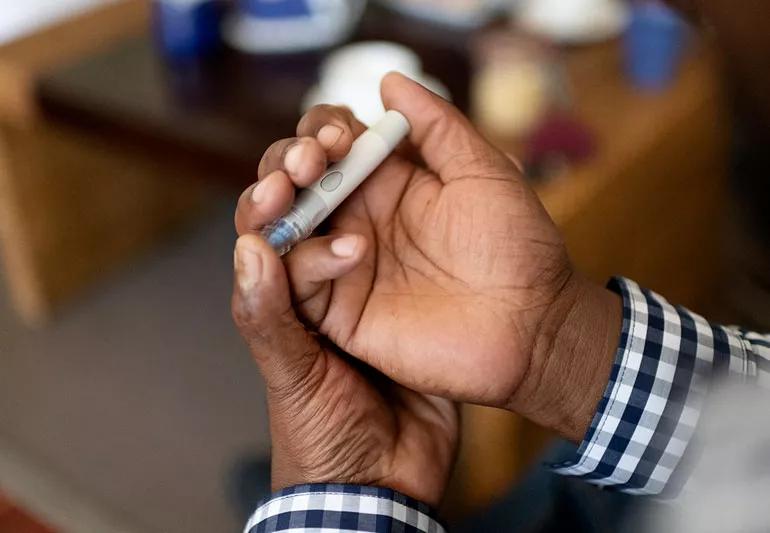It's important to know your numbers before adjusting meds

Image content: This image is available to view online.
View image online (https://assets.clevelandclinic.org/transform/8cf78485-1869-48f7-82d6-4bfaa88fe0dd/diabetesTest-1246362723_770x533_jpg)
man checking glucose levels
Skipping a meal is typically no big deal. But if you’re a person with diabetes, skipping meals or a lack of meal structure could result in dangerously low or high blood sugar levels. It is important to know your numbers especially when taking certain medications to lower blood sugar levels.
Advertisement
Cleveland Clinic is a non-profit academic medical center. Advertising on our site helps support our mission. We do not endorse non-Cleveland Clinic products or services. Policy
Fueling our body with at least three meals a day is beneficial in diabetes and weight management, says registered dietitian Carolyn Garvey. However, even an occasional missed meal can throw off the balance between food intake and certain diabetes medications.The result is blood sugars that are too low (hypoglycemia) or too high (hyperglycemia) — and that can be dangerous.
“If you take medications for diabetes that can cause low blood sugars, you should try not to skip meals,” says Garvey. “If you’re just not up to eating on a regular schedule, talk to your doctor about diabetes medications that won’t cause low blood sugars,” she says.
When you’re ill or just don’t feel like eating much, it’s important to monitor your blood sugar levels more closely than ever. How often depends on whether you have Type 1 or Type 2 diabetes and what medications you take.
For Type 1 diabetes: Be sure to monitor your blood sugar before meals and before bedtime, typically four times per day, says Garvey.
Beyond that, check your blood sugars if you notice symptoms of low blood sugar. Those symptoms include:
Advertisement
For Type 2 diabetes: If you’re taking a sulfonylurea medication, check your blood sugars at least twice a day — in the morning and at bedtime.
“It’s important to keep in mind that sulfonylureas may cause your blood sugar to drop during the day if you don’t eat anything after taking your medication,” Garvey says.
If your only treatment is metformin, you may not need to check your blood sugar more than once a day. This medication doesn’t typically cause hypoglycemia.
“It’s important to be aware of the symptoms associated with low blood sugars,” says Garvey. “Be ready to check your blood sugar and eat or drink 15 grams of simple sugar such as glucose tablets or 4 ounces of juice to correct a low blood sugar if needed.” This treatment is also recommended for Type 1 diabetes, she says.
If you’re not eating due to an acute illness like the flu or an infection, it’s also common for your blood sugars to rise.
“When you have diabetes and are acutely ill, you should check your blood sugars up to four times per day, drink plenty of fluids and contact your doctor if your blood sugars are consistently over 250,” Garvey says.
If you find that you’re eating less due to an illness or other factors, your medications may need adjusting, so it’s important to talk to your doctor. Meanwhile, here are some general guidelines:
Although you may think you’ll know from experience when your blood sugar is out of whack, regular monitoring is the only way to truly make sure.
“It’s important to keep in mind that the symptoms of high or low blood sugars may fade away after several years of living with diabetes, especially if your blood sugars haven’t been well controlled,” says Garvey.
“Also, some of the symptoms of high blood sugars and low blood sugars are the same, so it’s important to check your blood sugar first, if possible, before treating it,” she says.
Advertisement

Sign up for our Health Essentials emails for expert guidance on nutrition, fitness, sleep, skin care and more.
Learn more about our editorial process.
Advertisement
With a weakened immune system, every protection counts
How weather can affect your blood sugar
There are better breakfast options, but if it’s got to be cereal, look for whole grains, high fiber and no added sugar
Planning ahead, checking in with your care team and being vigilant about blood sugar monitoring can help ensure a safe fast
A diabetes diagnosis, new or long-standing, can trigger reactions like grief, stress, depression and frustration, but symptom relief and help are available
Type 1 diabetes happens when your body doesn’t make insulin, while Type 2 happens when your body can’t use insulin properly
There is an indirect link between the sweet substance and the condition
The short answer: Yes, but you need to eat it in moderation and keep track of how much you consume
Type 2 diabetes isn’t inevitable with these dietary changes
Applying a hot or cold compress can help with pain
Pump up your iron intake with foods like tuna, tofu and turkey